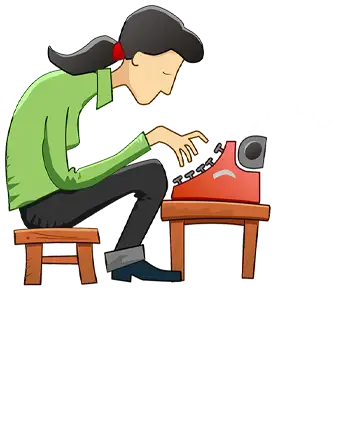A Celebration of Those Who Write Right (and Sometimes Wrong on Purpose)
Wordsmith Day is a lesser-known but highly deserving celebration dedicated to the magicians of language—writers. Whether they're crafting novels, scribbling poetry, or piecing together the next viral blog post, Wordsmith Day is all about tipping our hats (and perhaps refilling their coffee cups) to those who paint with words.
Why Celebrate Wordsmith Day?
Wordsmith Day isn't just another date hiding quietly on the calendar. It’s a toast to the linguistic artisans who make our world more vivid and our emotions more articulate. It’s a day to honor those brave souls who stare down the blank page like it owes them money and then dare to fill it with precise and powerful language.
Writers rarely get ticker tape parades or free donuts at the drive-thru. They’re the behind-the-scenes architects of the stories, slogans, and speeches that stir our hearts or at least get us to click “read more.” Their influence spans from musty parchment in ancient libraries to lightning-fast tweets that spark movements.
On Wordsmith Day, we acknowledge that the right words can start revolutions, mend hearts, and occasionally, get you out of a parking ticket. Writers wield pens and keyboards like wands—casting spells that make us laugh, cry, or question everything we thought we knew about semicolons. That’s magic. Real magic. No wand-waving required (unless that’s your writing process—no judgment).
Writers - The Unsung Scribes of Civilization
Let’s face it—without wordsmiths, the world would be a much quieter (and far less witty) place. These unsung heroes of the written word shape our understanding of history, give voice to the voiceless, and capture moments that otherwise drift away into the ether. Shakespeare didn’t invent love or jealousy, but he did give them monologues.
Think about it: every famous speech, unforgettable movie quote, stirring novel, or even side-splitting meme had a writer behind it. Wordsmiths preserve languages, invent them (shoutout to Tolkien), and keep the art of storytelling alive and well—even when grammar-check is being unhelpfully aggressive.
 A Day in the Life of a Wordsmith
A Day in the Life of a Wordsmith
Imagine waking up to the gentle caress of the muse... or, more likely, the cold glare of a blinking cursor. A wordsmith's day may start with optimism but often detours through doubt, procrastination, and Google searches like “synonyms for existential dread.”
Coffee is not so much a beverage as a co-author. Snacks are important too—some writers swear by pretzels, others by chocolate, and some live dangerously with Cheetos and white keyboards.
Writer's block lurks around every corner, a shadowy beast fed by distractions and self-doubt. But when the words do flow? It’s euphoric. It's jazz. It's lightning in a bottle... that you’ve been trying to uncork for hours with a bent paperclip.
Fun Facts About Wordsmiths and the Craft of Writing
Think writing is all coffee and brooding stares out the window? Well… you're not wrong. But there's a lot more to the world of wordsmiths than meets the page. From ancient scribes to typo-fueled tweets, the history and quirks of writing are filled with surprises. Here are a few fun tidbits that prove writers are some of the most fascinating (and occasionally weirdest) people around:
- The longest sentence ever written comes from Victor Hugo’s Les Misérables and contains 823 words. Yes, 823. It’s practically a cardio workout for your eyeballs.
- Mark Twain was so dedicated to clarity, he once said, “I didn’t have time to write a short letter, so I wrote a long one instead.” Short and sweet is often harder than long and rambling!
- The word “serendipity” was coined by writer Horace Walpole in 1754. It’s based on a Persian fairy tale and proves that sometimes, wordsmiths just make stuff up—and it sticks.
- Edgar Allan Poe wrote with a cat on his shoulder. Whether for inspiration or emotional support remains unclear, but it definitely gives “writing buddy” a whole new meaning.
- The first known author in recorded history was a woman named Enheduanna, a priestess and poet from ancient Mesopotamia, writing around 2300 BCE. Talk about the original Wordsmith!
- The word “alphabet” comes from the first two letters of the Greek alphabet: alpha and beta, which is somehow both clever and kind of obvious, once you know.
- Coffee and writing go way back—Honoré de Balzac reportedly drank 50 cups a day while writing. No word on how much was actually written versus jittered into existence.
- Shakespeare invented over 1,700 words, including “bedazzled,” “eyeball,” and “swagger.” So, next time someone makes up a word, just call it "being literary."
Tools of the Trade
On Wordsmith Day, let’s celebrate the tools of the trade. The humble notebook. The comforting clack of a favorite keyboard. The thesaurus, both in print and as an open tab that’s never closed. And let’s not forget autocorrect—part loyal companion, part unpredictable chaos gremlin (“ducking” chaos gremlin, to be exact).
Whether scrawling ideas on cocktail napkins or dictating into voice-to-text apps while walking the dog, writers are always writing—even when they pretend not to be.
Celebrate Wordsmith Day Your Way
Wondering how to celebrate? Easy.
Before you panic and assume Wordsmith Day requires feathered quills, candlelight, and a tortured soul, relax. Celebrating this day can be as simple—or as eccentric—as your favorite font. Whether you’re a seasoned scribe or someone who only writes when guilted into sending holiday cards, there are plenty of ways to honor the word-loving spirit of the day.
- Read something you love—a novel, a poem, or that weirdly emotional restaurant review you bookmarked months ago.
- Write something—a short story, a thank-you note, or your own epic grocery list in iambic pentameter.
- Attend a local open mic, or host a mini writing contest among friends. Prizes can include chocolate, coffee, or bragging rights.
- Thank a writer—drop a note to your favorite blogger, author, or journalist. Tell them their words matter (because they really, really do).
- Try something new—write a haiku, a limerick, or a tweet that doesn't get deleted five seconds later.
Even schools can join in with creative writing prompts, silly story swaps, or a classroom challenge to write the world's weirdest metaphor.
Because Without Writers...
Without writers, we’d be stuck with emojis doing all the heavy lifting. 📚❤️💀🍕 And sure, they’re expressive—but nothing beats the nuance of a sentence that says exactly what you feel before you even knew how to feel it.
So here’s to the wordsmiths: the dreamers, the documenters, the pun-slingers and plot-twisters. Whether you’re a published author or just journaling in secret, Wordsmith Day is your standing ovation.
And if all else fails? Just open a blank document and type, “Once upon a time…” The rest will find its way.
Please Share our Content






 A Day in the Life of a Wordsmith
A Day in the Life of a Wordsmith








 "Sláinte!" is a traditional Irish expression used as a toast, equivalent to "Cheers!" in English.
"Sláinte!" is a traditional Irish expression used as a toast, equivalent to "Cheers!" in English.